Leslie Odom Jr. Says Too Many People Are 'Doing It for Clicks'

Leslie Odom Jr.
This fall, Leslie Odom Jr. is laughing in the face of lazy Sundays.
Just before noon in early October, the casually dressed actor arrives at The Music Box Theater in Times Square in New York City and walks up a winding staircase to his cozy dressing room that overlooks 45th Street. In a few hours on this “day of rest,” he’ll go from zero to 100 playing the titular role in a matinee performance of the new revival of the play Purlie Victorious: A Non-Confederate Romp Through the Cotton Patch. Then he’ll do it all again that evening.
Just to add to the fun, he admits he has yet to eat or drink—“I’m going to have a half caff when we’re done!”—and is running low on sleep. “My kids woke me up pretty early this morning,” he says of his 6-year-old daughter, Lucille, and 2-year-old son, Able (with actress wife of 10 years, Nicolette Robinson). “Usually, I try to conserve my burst of energy because the play is only 100 minutes and it goes by like a shot. There’s no warming up!”
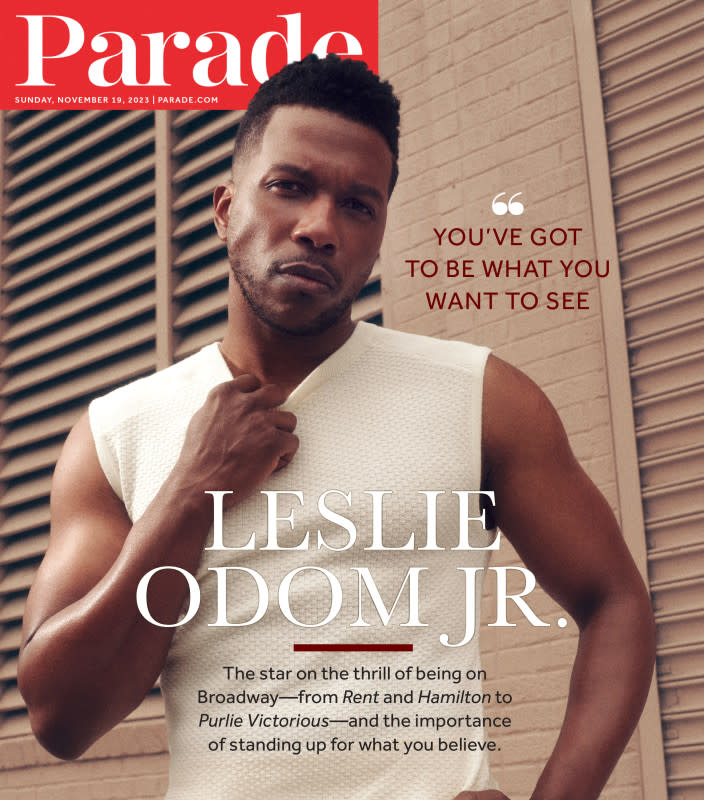
COVER PHOTOGRAPHY BY JONNY MARLOW
Except, you could say that the actor, 42, has been warming up for this moment for more than two decades. Since making his Broadway debut at age 17 in Rent, in 1998, the NYC native and Carnegie Mellon University graduate has proven himself to be a master of the stage. After all, it takes a true star to portray founding father Aaron Burr in a Broadway musical, murder the hero in a gun duel eight times a week and still come out of the production as a breakout Tony-winning talent.
Indeed, the 2015 phenomenon known as Hamilton turned out to be the ultimate curtain call. Odom has since starred in films such as One Night in Miami (for which he was nominated for Oscars in the acting and music categories), The Many Saints of Newark and the recent The Exorcist: Believer. He’s also released five albums—including his latest, When A Crooner Dies. “It’s all original music, and it’s the kind of record meant to be heard,” he says. And if the music thing suddenly goes away? Earlier this year, he and Robinson co-authored the children’s book I Love You More Than You’ll Ever Know. It’s a New York Times bestseller.
But Purlie Victorious, set to run through Feb. 4, marks his first headlining role in any medium. His Purlie Victorious Judson is a reverend who returns to his hometown in the deep South circa the late 1950s to claim a $500 inheritance and save his church. (He honorably deceives and schemes his way to getting the money.) Originally starring, co-written and directed by Ossie Davis, the comedic-yet-socially charged play hasn’t been seen on Broadway since its 1961-62 run. Former first lady Eleanor Roosevelt was such a fan when she saw it in the ‘60s that her rave review is quoted outside the theater; Odom keeps a copy of the vintage Playbill under a plastic case in his dressing room.
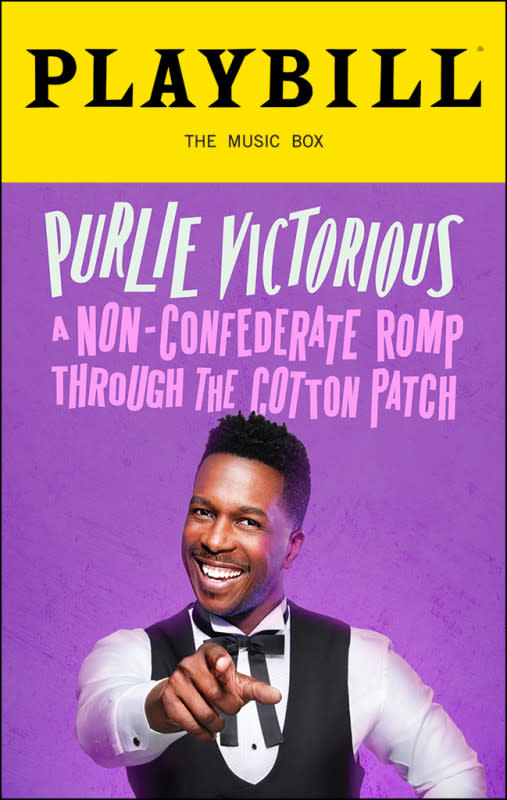
Playbill
“The night after the Tony Awards in 2016, I said in an interview that this was the next thing I wanted to do,” he says. “I just had the most satisfying and rewarding experience of my career with Hamilton. But I thought it would happen right away—I didn’t expect it to take seven years.” (He and Robinson are also co-producers).
Four days after Purlie Victorious opened to stellar reviews, Odom talked to Parade.
There are a lot of floral arrangements in this dressing room. What’s going on in here?
They’re from opening night. Some are at home, and some of the arrangements stayed here. This bouquet is from my dear friend, [actress] Megan Hilty. The orchid came from my friend Sheryl Lee Ralph. That pretty purple arrangement came from my producing partners at the National Black Theater in Harlem. There’s nothing like a Broadway opening night. Even on a show that’s not successful, which I’ve done. The energy is totally specific.
Is the pressure off when you’re not singing your heart out in a three-hour musical every night?
Making theater right now, the pressure is never off. This is a very sensitive time. Audiences are not as robust as they once were. It takes three weeks to build a new habit and people were without theater for almost two years [because of the pandemic]. Theater is a space of great joy and catharsis, and we’re still doing the work to remind people about what can happen in these spaces.
That’s fair. But is it any easier?
This is harder. I know when we first started, people were expecting to hear me sing. And I do understand that I was introduced to people in a certain way. It takes some doing to get people to follow you someplace else and be comfortable seeing you in another way. Hopefully they can still have a good time.
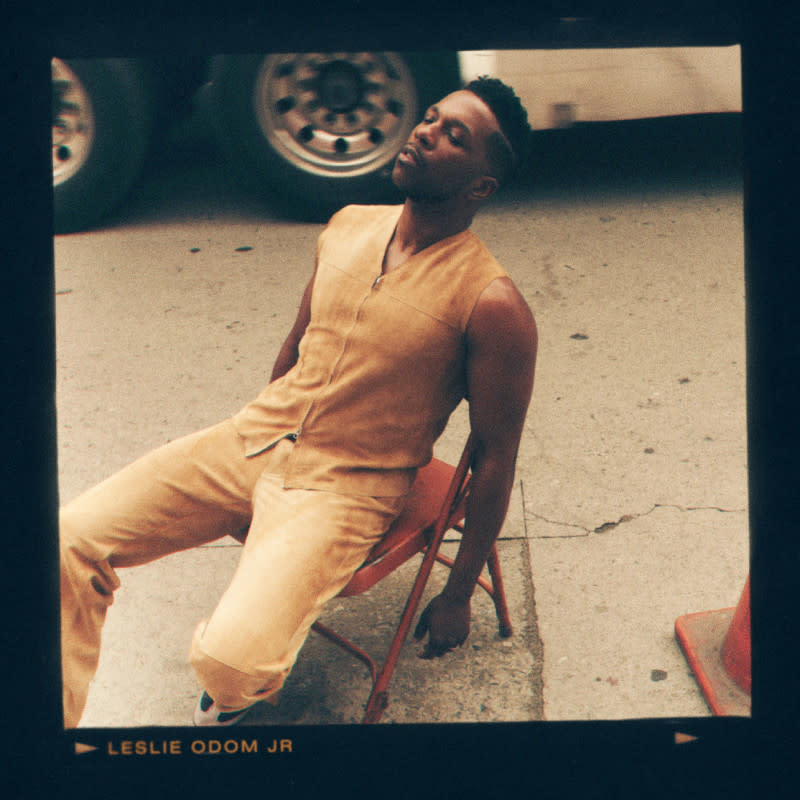
BMG Rights Mana
Do you think you were born talented?
I don’t think I was particularly gifted or extraordinary in a way that separated me from anyone else. I sang in church growing up in Philadelphia but I wasn’t some kid who stopped the room. I wouldn’t be on American Idol. I had an OK voice. I worked on it. I worked with it. The only reason I was willing to do it was because [when I was singing] I didn’t feel so nervous when I got up in front of people.
You moved from New York to Philadelphia as a kid. What stands out about your childhood?
I had great friends in Philadelphia. I also grew up in a thriving Black arts community. My first acting classes were at a Black theater company called the New Freedom Theater. My first dance classes were at The Philadelphia Dance Company. That instilled me with a pride and confidence that I carry with me to this day.
What made you think you could be a full-time performer?
Rent. Before that, I was a kid playing sports and learning how to do math. I didn’t have some grand ambition. Then Rent came along. I got the cast album and it was a world that felt so inviting. I wanted to be friends with those people! I was 13, which is young enough and yet old enough that I could start to imagine what I wanted to do when I grew up. But it didn’t matter to me if I was pulling the curtain or sewing buttons on costumes. I just wanted to be part of the community.
How did you end up appearing in Rent at 17? You must have been very confident at that audition.
I just wanted to meet anybody who had anything to do the show! I thought if I did my very, very best then maybe my questionnaire and my picture—it wasn’t even a headshot; it was some picture my mom took that I ripped out of a photo album—would go into a filing cabinet. And then when I was an adult, they would call me to come in and hand out Playbills. I did not think I would get a part. But it put me on the right path and it changed my whole life.
Your parents let you go to Broadway when you were that young?
New York was our second home. My grandparents lived in Queens, and I lived with them when I did Rent.
After Rent, why did you set off for Hollywood? You’ve popped up in a lot of TV series.
I went to college and by the time I graduated, the realities of the business became clear. The most plum roles on Broadway were going to TV and movie stars and recognizable names, whatever that meant. I knew that Hollywood would serve me well because my real heart was on Broadway. So that was my vision.
Did you enjoy that time of your life?
Oh, very much. It was totally out of left field. I didn’t know anybody on TV. You know, I graduated Carnegie Mellon with Josh Gad, Josh Groban and [Eastbound & Down actress] Katy Mixon. They had a lot more response in L.A. than I did. I wasn’t the guy that everybody wanted to meet. But a VP of casting at CBS saw me at a showcase and said, “When are you moving to L.A.? Because I want to put you on TV.” I was there for 72 hours, and I got my first job.
Related: Everything We Know About the New 'Exorcist' Movie, ‘The Exorcist: Believer’
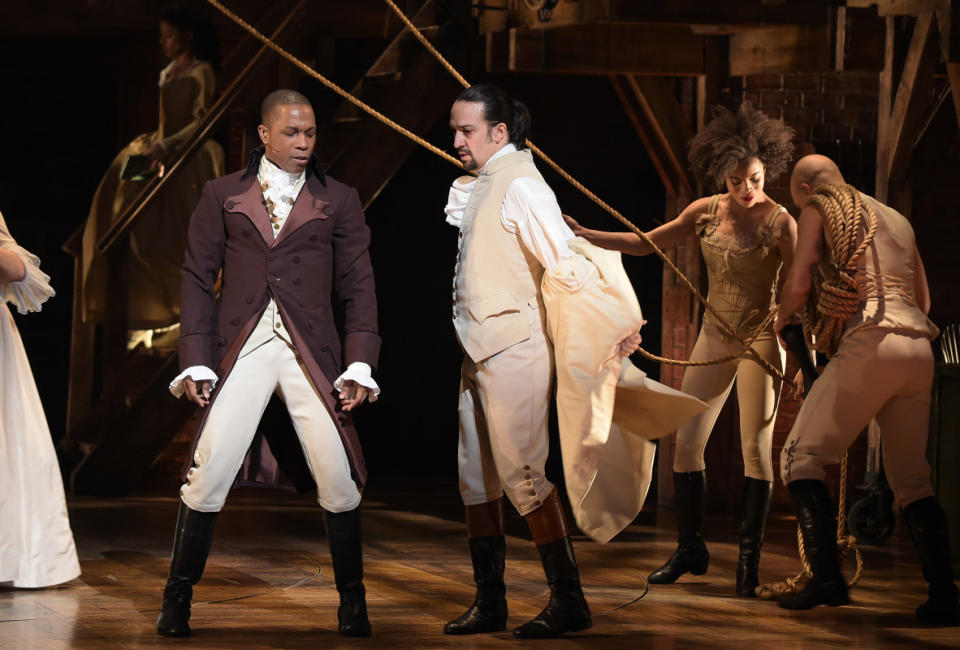
Getty Images
How did Hamilton come into your world?
I had seen the very first reading of Hamilton up in Poughkeepsie [New York] at Vassar. They do a new works festival, and my wife was working up there so I had visited her. I was just a fan! I thought it was the freshest and boldest thing. It made me feel like that 13-year-old kid hearing Rent. Nothing had made me feel that way ever since.
Then what happened?
A few months later, I get an email from [playwright and star] Lin-Manuel [Miranda]. The subject line was “Octo-Burr-fest.” He was still working on act two. Nicolette has always been in charge of my calendar and I asked her, “Am I free?” She said yes, so I did it. But I had a goal in those five days: I didn’t want to tell him how much I loved his work and appreciated what he was writing. I just wanted to show him the interpretation of the character so that he would take notice and want to keep me around.
When it finally came together, did a part of you worry the concept was too out-there to succeed?
I knew some people might think that, but I had seen it. I knew how it affected me. I had the experience that now millions and millions of people have had. In just 15 minutes, you’re swept away and enchanted. It’s almost like a sci-fi experience because it shouldn’t make sense! It doesn’t make sense to see Daveed Diggs as Thomas Jefferson! But something happens inside your mind and heart and body when you see it. I was never going to question that feeling.
What was your coolest pinch-me moment during Hamilton mania?
Performing at the White House for President Obama [in 2016]. That was the pinnacle. For 45 minutes, the leader of the free world and his staff cleared their schedules to give us their undivided attention. That was it. It elevated what we do in these theaters to a level that I had never even really dared to dream.
What kind of music do you listen to? Are you into what your kids like?
Yeah, no! My playlist includes some of the pop music from my youth. Like, I want my kids to know Michael Jackson, Bobby Brown, New Edition. I want them to have a context for the world they’re seeing. Eventually we’ll get to James Brown and Sam Cooke.
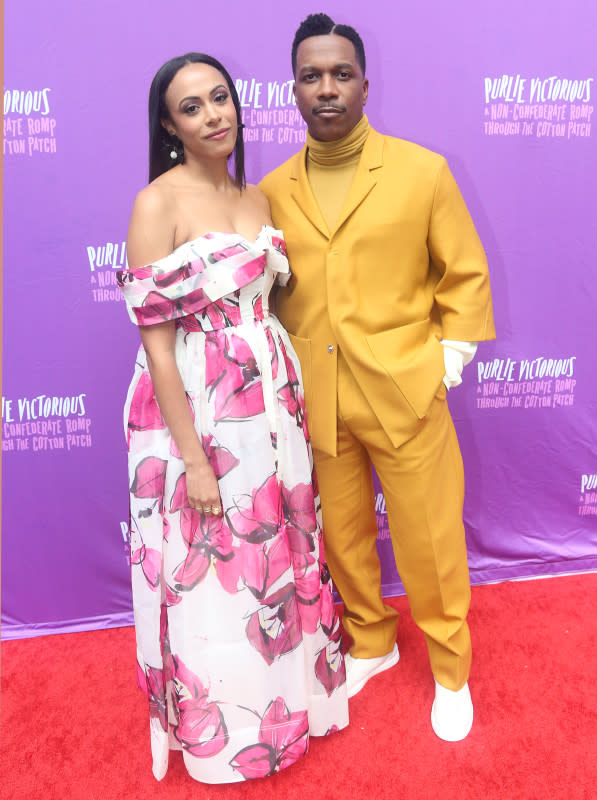
Getty Images
Do your kids have musical talent, too?
They’re both way better than I was at their age. But I have to say, I hope I’m raising a little journalist and a little doctor. For Nicolette and I, this is our chosen vocation. I would be very, very happy if my kids decided to do something else. I just want them to find something they’re passionate about. You know, a couple of years ago, I was writing in my journal and started thinking about examples of people on the world stage who have conviction. Too many people feign it—they don’t believe in what they’re saying. They’re doing it for clicks and attention, do you know what I mean? And my list wasn’t as long as I wanted it to be.
And what did you take away from that lesson?
I realized I needed to be the example of conviction that I’m looking for. If I do it for my kids, I have a better shot at doing it for other people. The way this particular time is in the world, you’ve got to be what you want to see. You really do have to make a decision—especially if you’re looking for it, if you’re on the search for something spiritual or if you’re looking for somebody that can show you how to fight for justice or fight on the planet. We’ve got to be those things right now.
